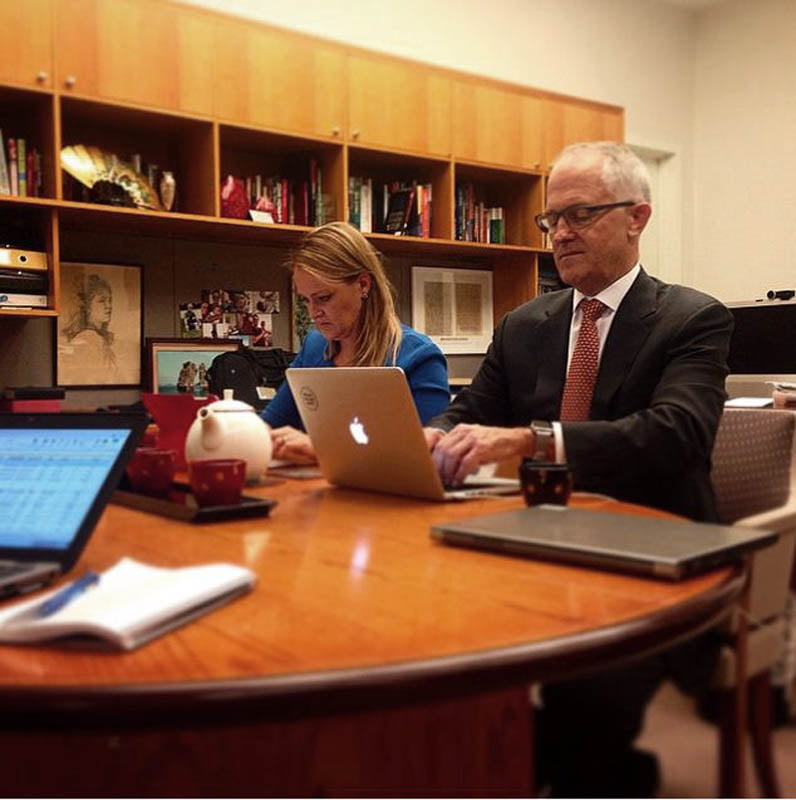Malcolm Turnbull’s re-framing of the Coalition economic argument at the Brisbane Club this week was directed at his colleagues as much as to his self-proclaimed constituency at the “sensible centre.” But it was also a massive shout-out to the tech sector, and to the nation’s home-grown tech-enabled startup pioneers.
Of course this was a speech about leadership, for no other reason than it was a demonstration of leadership.
We’ll leave the “Canberra insiders” to study the entrails, but it is worth noting that this was a speech of positive pragmatism, in which the opportunities for Australia are outlined as neatly and prominently as the challenges.

Turnbull is re-setting expectations about our economy and our lifestyle in a way that doesn’t make people’s hair stand on end. He has replaced the language of fear – think “budget emergency” – with something aspirational.
This is not a speech that the Treasurer or the Prime Minister could make.
It hardly seems possible that an argument about our first-world economy could be constructed without the disruptive technology figuring prominently. And yet this is how Mr Hockey and Mr Abbott have framed the conversation.
So it is most welcome that a speech about the budget is prefaced by contextual themes of technology and innovation, and about the challenges and opportunities of disruptive change. Only within this context is budget consolidation considered.
This is glass-half-full realism that puts our ability to innovate – and embrace to rapid technological change – at the centre of economic prosperity. It moves the conversation beyond iron ore prices.
“Every day more jobs, industries and businesses in Australia become trade-exposed, competing with the rest of the world in a way that was unimaginable a few years ago. Even in non-traded sectors, technological change is the great disruptor, from newspapers to taxis,” Mr Turnbull said.
“To succeed in this environment individuals and businesses need to be smart and nimble, productive and innovative, creative and global. They need to see disruption as an opportunity to reach into other markets or become more efficient within our own.”
Of course government has a role to play, but Mr Turnbull is not the interventionist type.
Atlassian founder Scott Farquhar’s otherwise excellent JJC Bradfield lecture last year outlined the many challenges facing Australia and its tech sector, and then implores government to “do something.” This is a common refrain from the startup sector: that the government is hopeless, that government doesn’t get it, that the government should “do something”.
Malcolm is having none of it. He is a free market dude from the bottom of his boots to the tips of his formerly magnificent hair. (Even his own massively stripped-down NBN must drive him crazy for its “too much government” qualities.)
The characteristics of successful and innovative economies “arise organically,” he says, through companies, individuals and “the free operation of open markets, not by design.”
“But in the end the key leadership in building a more diverse, adaptable economy must come from the companies and individuals whose success and achievements bring it into being,”
“The best contribution governments ultimately make is to get out of the way, except where they enhance rather than constrain the freedom and motivation that drive entrepreneurship and innovation. Government must help set the table, not determine the menu or cook the meal.”
There is a lot in this speech for the tech sector, and by extension, for the rest of the economy. Of course, its thesis was about structural problems with the federal budget and the hitherto shithouse job the Coalition has done in selling its economic program.
Of course, Mr Turnbull probably didn’t do himself favours by volunteering his own portfolio’s NBN and Australia Post reforms as a world’s best practice approach to selling policy to the public. If he was trying to give his colleagues the heebee geebees, my guess is that he succeeded.
Any advanced and technologically sophisticated economy “depends upon a dynamic and entrepreneurial culture that encourages innovation and diversity, tolerates risk and failure, and copes easily with uncertainty and ambiguity.”
This is the language of our industry, which is why this speech went down so well among tech people.
If culture flows from the top – and it does – it would have been nice if these talking points had come from the Prime Minister. But they didn’t.
And no-one would have believed him if they had.
Do you know more? Contact James Riley via Email.

